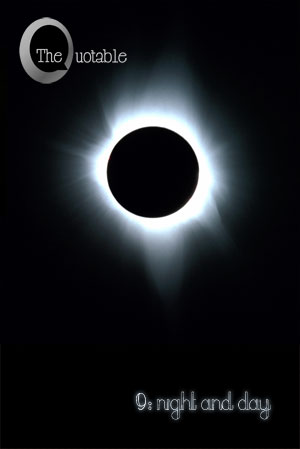The kitchen is dark and alive with shadows. They are eerily still, the worst kind. I cannot connect them to tangible objects, even here, where everything is so familiar: my empty plate, a tub of butter, the open jam jar. These I see and yet something is amiss, here in this murkiest of mornings. Where is my butter knife? Is that it on the floor? My butter knife is on the floor and the kitchen is shrouded in shadow. I stare, unseeing. Is this the dire consequence that Gran warned me about?
“Shadows are weak points, boy,” she said one day. “Shadows are places where lights should be but aren’t. Watch the shadows, boy, or you might find yourself where you oughtn’t to be, eh? The other side.”
Not just the other side, mind, but the other side. She said it with emphasis.
Everyone agreed that my Granny was crackers, even my Pa. “Like a demented canary,” he used to caution me, “butting her head against one of those silver bells. She’s fun to listen to, your Granny, but that doesn’t make her no wise owl, understand?”
Yes, Pa. I know.
But what I said was a lie. Really, I was never quite sure.
Gran may have been daft but she told me things, like how if you go into a skid you should turn in the direction of the skid, not against it. “If you turn against it you’ll flip the car, boy. It doesn’t matter which bit of the world you’re in. You’ll not feel any Coriolis effect, eh? It’ll just be one side or the other.”
Some of the things Gran said sounded almost real. Others were canary-talk. But if you take someone half-seriously then you’re halfway to believing them, aren’t you? That’s why I’m always so careful in the kitchen.
“You ought to guard yourself in the kitchen,” Gran warned me. “Kitchens are full of weak points, boy. You look over that bread real careful. See if you can see it turn to toast. They call that a Maillard reaction but no, it isn’t. That’s bread going from one side to the other, boy, and it’s not coming back, eh? But look out, don’t stop. Take your eyes off and it’ll be going even further, like the sound water makes as you fill it to the top of the glass, eh? You know it’s at the top because of the pitch, but what if the water keeps going up, without spilling, mind. Can you imagine that sound, boy? That’s where the toast’ll be going, eh? The other side.”
Not long before Gran passed on, I asked her what’s on the other side.
“What, boy?” she frowned.
“The other side, Gran! You never told me what’s on the other side.”
Gran’s eyes lost focus, and she huddled back in her rocker. “Eh?” she muttered. “What? The other side, boy? Why would anyone want to know that?”
Then she pursed her lips and began rocking, into the shadow of the birdcage and back out again, over and over. We buried her two days later.
“See here, lad,” Pa told me after the funeral. “Your Granny, she had a hard brain, right, and she sharpened it on those white things, those washed-up old bits of cuttlefish, understand? Now, that’s no bad thing, but those ideas of hers, they’re like chewed-up bits of seed, right? You don’t need any of that.”
Pa thought I should pay my respects and then give Gran the old never-mind. He thought I’d be better off without her husks of wisdom.
But it’s dark now, and my butter knife is on the floor, and I can’t help thinking about those crazy things Gran said.
I used to stand in front of the basin, my hands clean, and just watch the soapy water spiral down the drain. Does it really go backwards on the other side of the world? And what about the other side? It seems crazy to believe, so maybe I don’t, right? But even so, I’m always careful when I make my breakfast.
“Save yourself a lot of time if you’d just put the bread in first,” Pa would say. “No need to do everything beforehand, right? You’re not having any of those strange thoughts, are you, lad? None of those thoughts like your Granny had?”
No, Pa. I’m not.
But once again I told a lie. I was having those thoughts and I half-believed them, too. Maybe more than half.
That’s why I always have my plate ready first, with the butter and the jam and a knife on the side. I set it all up and only then do I put the bread in the toaster, counting the seconds until it turns into toast. I wait for it to pop up, no distractions. Never any distractions. Not in the kitchen.
Except for today.
Is that a noise at the door? Pa’s not due back. So what? Intruders? I reach behind me for the butter knife, my fingers scrabbling blindly over the empty plate. It better not be intruders, not at breakfast. I can’t have any distractions at breakfast. The toast might–
The toast.
Afterwards, I can hear Gran’s voice, saying, “Shadows are weak points, boy. You were supposed to watch out for the toast, eh? You’re weren’t supposed to follow it.”
But Gran’s gone to the big birdhouse in the sky. It’s Pa whose shadow falls upon me. Smoke from the toaster has set off his cough and, teary-eyed, he holds a handkerchief over his mouth and nose. Falling painfully to his knees, he reaches for me, his hand faltering.
“You want to know what’s here, eh?” Gran asks me. “We are, boy, and you have dropped your knife in the shadows. On the other side.”
She snorts like a warthog but Pa doesn’t notice. He can’t hear Gran, and he can’t hear me. Not anymore. We have crossed that fine line, Gran and I. We are lost in the shadows.
Jacob Edwards graduated from the University of Queensland with a BA (English) and an MA (Ancient History). He stacks deck chairs for Andromeda Spaceways and lives in Brisbane, Australia, with his wife and son. Jacob writes creative and academic non-fiction, short stories, reviews and poetry, and his work has appeared in journals, magazines and anthologies in Australia, England, Canada and the US. He may be found online at jacobedwards.id.au










